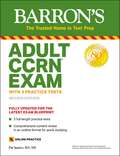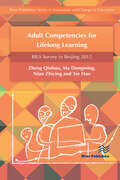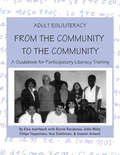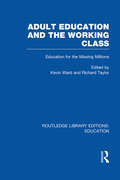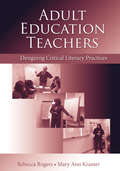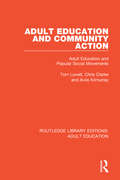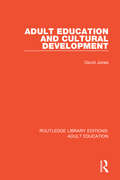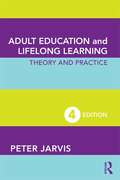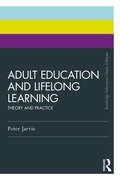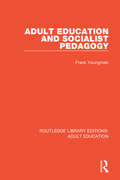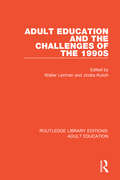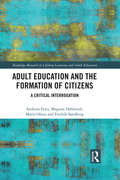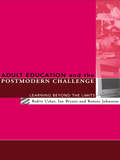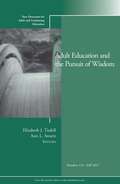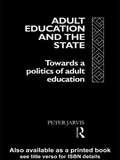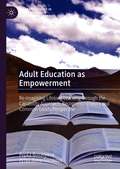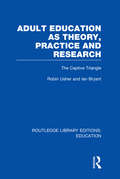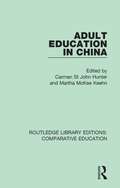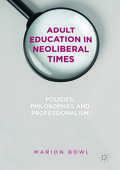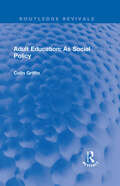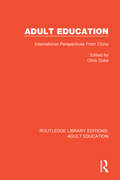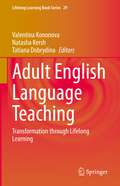- Table View
- List View
Adult CCRN Exam: With 3 Practice Tests (Barron's Test Prep)
by Patricia Juarez APN CCNSBarron&’s Adult CCRN Exam provides all of the key concepts you need to pass the Adult CCRN exam, with detailed review and full-length practice tests to help you feel prepared.This book features:A 25-question pretest to help pinpoint areas in need of intensive studyDetailed subject reviews, including Cardiovascular Concepts, Pulmonary Concepts, Professional Caring and Ethical Practice Concepts, and more, in an easy-to-digest outline format, along with corresponding practice questions and answer explanationsTwo full-length practice CCRN tests in the book, each with 150 multiple-choice questions and fully explained answersOne full-length online practice exam with all questions answered and explainedMore than 500 practice questions overall, for review and studyCCRNs who have successfully passed the test report that self-study with sets of practice questions is an excellent strategy for success. Don&’t take chances with your certification—let Barron&’s CCRN Exam help you achieve the next level of professional achievement.
Adult Competencies for Lifelong Learning
by Zheng Qinhua Ma Dongming Nian ZhiyingBeijing Institute for the Learning Society (BILS) was inaugurated in October 2011 through the joint efforts of Beijing Leading Group Office for Construction of Learning City and Beijing Normal University. The main focus of BILS lies within the education discipline.The Institute is building a platform that integrates intellectual resources of universities in Beijing to serve the learning city's construction, to explore the constructing mode for Beijing learning city, to enrich and develop the theory of building a learning society with Chinese characteristics, to assist the government in public policies, and to guide the practice of learning city's construction. At present, two years since it was established, together with Beijing City and related research institutions, the Institute has participated in numerous research studies, including An International Comparative Study on Modes of Learning City Construction in the World, Research and study on Beijing Lifelong Learning Competence, and Study on Legislation of Beijing Lifelong Learning. Oriented towards the practice of the construction of Beijing learning city, the Institute integrates universities in Beijing and related research organizations in China and abroad to keep pace with international developments, research practical problems, explore innovative approaches, promote exchanges and cooperation, train professionals, and lead the development of the practice. It is striving to build a high-end open research platform with international influence that integrates academic researches, policy advisories, talent training, and training services. This book summarizes the goals set by BILS, and what has been achieved thus far.
Adult Continuing Education and High School Course Catalog
by Hadley Institute for the Blind Visually ImpairedAdult Continuing Education and High School Course Catalog 2016-2017. Catalog of current distance education courses for the blind or visually impaired. Various media for the courses is available including; Braille, CD, Digital Talking Books, Large Print, Online and more. Not all courses are available in all formats.
Adult ESL/Literacy From the Community to the Community: A Guidebook for Participatory Literacy Training
by Ana Zambrano Elsa Auerbach Byron Barahona Julio Midy Felipe VaqueranoAdult ESL/Literacy from the Community to the Community: A Guidebook for Participatory Literacy Training tells the story of a university-community collaboration to develop, implement, and evaluate a project designed to train immigrants and refugees as adult ESL and native literacy instructors in their own communities. Beyond the story of this one project, the book is also a clear and powerful explication of the underlying principles and premises of the program model it describes: community leadership development, a participatory approach to literacy instruction and instructor training, native language adult literacy instruction, and collaboration.
Adult Education & The Working Class: Education for the Missing Millions (Routledge Library Editions: Education)
by Richard Taylor Kevin WardThis book has two purposes: first to argue that there is a greater need now than ever before for liberal adult education for the working class. Such provision would both help to ameliorate the gross inequalities of our society and provide some counter-balance to the increasingly utilitarian and vocational orientation of post-school education. Secondly, the book aims to describe and analyse in some detail the community-based programme for various ‘disadvantaged’ working class groups that has been developed by a British Pioneer Work team concerned with adult continuing education. The methods, objectives and overall practice described in this case study are of relevance to those working in all sectors of adult and community education. This book is edited by two members of staff concerned with Pioneer Work development from the outset, and the contributors include other members of the Pioneer Work team of lecturers and researchers.
Adult Education For a Change (Routledge Library Editions: Adult Education)
by Jane L. ThompsonOriginally published in 1980 this book examines why adult education historically failed to attract working class students and whether experiences in Northern Ireland, the USA and Italy have any lessons to teach. Drawing together authors committed to adult education, the essays give fresh theoretical perspectives and explore developments of the post-War period, asking if they are designed to remedy educational wrongs or help perpetuate them.
Adult Education Teachers: Designing Critical Literacy Practices
by Rebecca Rogers Mary Ann KramerThis book examines the literacy practices of exemplary adult education teachers working within critical literacy frameworks. It provides an in-depth look at the complexity of adult literacy education through the lenses of these teachers. An understanding of this complexity helps teachers design literacy practices in classrooms on a daily basis. This is an important book for there is considerable pedagogical and political attention focused on adult literacy education at this time. As the field of adult education continues to grapple with issues of teacher professionalization/certification, it adds a much needed teacher perspective.Appropriate as a text for adult education courses, this volume will also appeal to researchers, teacher educators, practitioners, and graduate students across the field of literacy education.
Adult Education and Community Action: Adult Education and Popular Social Movements (Routledge Library Editions: Adult Education)
by Tom Lovett Chris Clarke Avila KilmurrayOriginally published in 1982, this book discusses the role of adult education in social and community action. In particular it presents a critical assessment of 'community education' and the theories of Illich, Freire and Gramsci and it proves that there is a radical adult education tradition in the USA, Europe and North America which can offer many insights into the contemporary debate about the role of adult learning. The material is based on a decade of practical involvement in community action and education in Great Britain and Northern Ireland, where - despite deep political and religious divisions - community action has united Catholics and Protestants in a common resolve.
Adult Education and Cultural Development (Routledge Library Editions: Adult Education)
by David JonesOriginally published in 1988, this book examines the concept of culture and the transmission of cultural values in relations to adult education. It emphasizes the importance of perceiving culture as a social construct which is part of a specific value system and questions how cultural development is promoted or hindered by adult education. It also describes a number of case studies from popular courses such as painting and pottery.
Adult Education and Health
by Leona EnglishThis comprehensive introduction to the study and practice of health and adult education provides the missing link for those seeking to better integrate their efforts in these two areas. Bringing together a distinguished interdisciplinary group of scholars and practitioners, the book speaks clearly to how teaching and learning insights can be used to improve health in clinical, higher education, and community settings.Along with a broad overview of concepts and strategies in the field, Adult Education and Health includes illustrative practical examples from a variety of contexts and a helpful glossary of key terms. It will be a useful resource for professionals and academics in many areas, including community health education, health policy, First Nations health, and the education of health professionals.
Adult Education and Lifelong Learning: Theory and Practice
by Peter JarvisNow in its fourth edition, Adult Education and Lifelong Learning is well established, and is regarded as the most widely used text about adult education. Fully revised and updated with substantial additional material, this new edition takes account of many changes which have occurred in the field of adult education. With new features for students and researchers, updates incorporate: material on the ethical and political implications of lifelong learning detailed information on changes relating to globalisation increased emphasis on societal changes information on the way technologies are affecting the way people learn changing approaches to knowledge, knowledge acquisition and knowledge assessment. Students of education and education studies will find this an invaluable course companion, whilst practitioners and researchers in adult and lifelong learning will find this new fully-up-to-date edition even broader in scope than the last.
Adult Education and Lifelong Learning: Theory and Practice (Routledge Education Classic Edition)
by Peter JarvisAdult Education and Lifelong Learning is regarded as one of the most widely used textbooks about adult education.Now part of the Routledge Education Classic Edition series, this key title combines the practical and philosophical to cover all areas related to the topic, including how we understand people as learners, how to teach adults, curriculum planning, distance education and assessment. It doesn’t shy away from complexity and asks difficult questions to provoke the reader into thinking about what lifelong learning really means. Not your basic ‘how-to’ book, it combines practice with theory and points the way to further studies and engagement in the field.With a new introduction by Professor Sam Duncan to contextualise the work, this is a must-read text for all education students as well as practitioners and researchers in adult education and lifelong learning.
Adult Education and Socialist Pedagogy: Radical Forum On Adult Education (Routledge Library Editions: Adult Education)
by Frank YoungmanOriginally published in 1986, this book was written at a time of increasing pressure on traditional areas of secondary and higher education and changing employment patterns - a situation which still exists today. Then, as now, there is increased awareness that the continuing education of adults has a vital role to play in our society. This volume develops a socialist pedagogy within adult education, using a Marxist theoretical framework. It proposes socialism as the radical form of change necessary to remove obstacles to greater social justice and educational equality and studies the implications of this political position for adult education.
Adult Education and the Challenges of the 1990s (Routledge Library Editions: Adult Education)
by Walter Leirman Jindra KulichOriginally published in 1987, this book focuses on the areas of labour and employment education, the environment and ecological education, peacemaking and peace education, intercultural relations and multicultural education, education in the developing world and the changing role of the university and technological innovation. This international collection of essays examines the relationship of adult education and learning to some of the major dilemmas of late 20th century society and looks at the contribution of adult education.
Adult Education and the Formation of Citizens: A Critical Interrogation (Routledge Research in Lifelong Learning and Adult Education)
by Magnus Dahlstedt Andreas Fejes Maria Olson Fredrik SandbergAdult Education and the Formation of Citizens turns attention towards normative claims about who adults should become through education, and what capacities and skills adults need to develop to become included in society as ‘full’ citizens. Through these debates, adults are construed as not yet citizens, despite already being citizens in a formal sense; this book problematises such regimes of truth and their related notions of the possibilities and impossibilities of adult education and citizenship. Drawing on empirical examples from the two main adult education institutions in Sweden, folk high schools and municipal adult education, it argues that, through current regimes of truth, these institutions become spaces for the re-shaping of the "abnormal" citizen. The book suggests that only certain futures of citizenship and its educational provision are made possible, while other futures are ignored or even made impossible to imagine. Offering a unique focus on critically problematising the role of adult education in relation to the fostering and shaping of citizens, the book addresses the important contemporary challenges of the role of adult education in a time of migration. Adult Education and the Formation of Citizens will be of great interest to academics, researchers and postgraduate students in the fields of adult education, lifelong learning and education.
Adult Education and the Postmodern Challenge: Learning Beyond the Limits
by Robin Usher Ian Bryant Rennie JohnstonThis book offers some suggestions as to ways forward from this dilemma. Drawing on the new intellectual frameworks of critical pedagogy, feminism and postmodernism and their impact upon educational theory, practice and research, the book focuses on the changing contexts of adult education. By building on the notion of going beyond the limits of certain current adult education orthodoxies, the authors try to provide alternatives for practice. The final three chapters deal with research, focusing on a critical macro-analysis of mainstream paradigms, a review of alternative approaches, and a more micro-analysis centering on the role of the socially-located self in the research process.
Adult Education and the Pursuit of Wisdom: New Directions for Adult and Continuing Education, Number 131 (J-B ACE Single Issue Adult & Continuing Education #116)
by Elizabeth J. Tisdell Ann L. SwartzDelve into the nature and mystery of wisdom in adult education, and what it might mean for the practice of adult education in the complexity of changing times. This issue begins with a look at the nature of wisdom, the wisdom of nature, and how it relates to current issues in the field of adult education. It then looks to neuroscience and the evolution of sacred knowing to explore the connection between learning and wisdom. Covering transcendent and practical wisdom, the issue then draws on Eastern, Western, and Mideastern cultural and religious perspectives to develop a fuller understanding of wisdom. Finally, it covers the aspects of gender and/or culture in relation to wisdom, though in quite different ways. This is the 131st volume of the Jossey-Bass higher education quarterly report series New Directions for Adult and Continuing Education. Noted for its depth of coverage, this indispensable series explores issues of common interest to instructors, administrators, counselors, and policymakers in a broad range of adult and continuing education settings, such as colleges and universities, extension programs, businesses, libraries, and museums.
Adult Education and the State: Towards a Politics of Adult Education
by Peter JarvisFirst published in 1993. Routledge is an imprint of Taylor & Francis, an informa company.
Adult Education as Empowerment: Re-imagining Lifelong Learning through the Capability Approach, Recognition Theory and Common Goods Perspective (Palgrave Studies in Adult Education and Lifelong Learning)
by Pepka Boyadjieva Petya Ilieva-TrichkovaThis book re-imagines the essence and role of adult education at both the individual and societal levels. It provides arguments for understanding adult education as a process of agency and empowerment, which has not only instrumental but intrinsic and transformative roles to play. This book brings together ideas from the capability approach with insights from recognition theory; the embeddedness approach; the political economic perspective for understanding public and private goods and the common goods perspective. The analysis draws on data from large-scale international studies – alongside qualitative data - and adopts a wide-ranging European comparative perspective. The book develops original instruments for measuring different dimensions of adult education as a common good, and its realisation in different social contexts. It is aimed at academics, students, practitioners, and policy makers interested in adult and/or higher education and the social justice perspective to human life.
Adult Education as Theory, Practice and Research: The Captive Triangle (Routledge Library Editions: Education)
by Robin Usher Ian BryantThe authors argue that the aim of research should be to improve practice through a process of critical reflection. Focusing clearly on the everyday concerns and problems of practitioners, they emphasize the importance of practical knowledge. Their definition of ‘practice’ is wide, and includes the generation of theory and the doing of research as well as front-line teaching. They show how notions of ‘adult learning’ and ‘the adult learner’ have been constituted mainly through theory and research in psychology and sociology, and examine action research as a mode of understanding. They conclude by looking at the curriculum implications for the teaching of adult education as reflective practice.
Adult Education in China (Routledge Library Editions: Comparative Education #7)
by Carman St John Hunter Martha Mckee KeehnOriginally published in 1985. China is currently making a massive effort to educate its workforce in a formal and structured system. A good deal has been written about China’s attempts, since 1949, to eradicate illiteracy and to universalise primary and secondary school education but the subject of this book is an educational system established to meet the needs of those already employed whether in government, industry or agriculture. Two study teams, sponsored by the lnternational Council for Adult Education, visited China in 1981 to explore this educational phenomenon. Their findings, updated by subsequent ICAE visits and enriched by further reading, form the basis of this book. This is the story of the Chinese experience of developing adult education. It will be valuable to those involved in extending education in the industrialised world who are pursuing modernisation goals for people long excluded from the formal education system.
Adult Education in Neoliberal Times: Policies, Philosophies and Professionalism
by Marion BowlThis book explores the realities of adult education practice in the current political and economic climate. With a particular focus on examining the effect of the multitude of changes in policy and philosophy over the past 30 years, the book explores how the values and career expectations of adult educators have been affected, and considers the implications for adult education as a field of professional practice. As well as exploring the broader international picture, the book draws on the findings of recent research into adult and community education practitioners' perspectives in two case study countries - England and Aotearoa/New Zealand - to illustrate how local contexts and cultures, as well as global trends, impact on the structure and organisation of adult education. By presenting the perspectives of adult educators, whose voices have been relatively absent from the recent literature, this book gives a unique insight into how their work has been adversely affected by funding and policy pressures in an increasingly insecure educational environment, and analyses their responses to the contradictions between their professional values and the expectations placed upon them by policy and funding changes. It will be of great interest to students and researchers working in Education and Sociology, and will also make compelling reading for policy-makers.
Adult Education: As Social Policy (Routledge Revivals)
by Colin GriffinFirst published in 1987, Adult Education: As Social Policy intends to provide an introduction to the social policy analysis of adult education, contributing to the larger literature around lifelong or continuing education. The roots of policy in alternative social welfare models are traced to their ideological sources and to the origins of adult education theory itself. The development of professionalism is also considered in relation to policy analysis and there is a case study of major policy documents to illustrate the analysis. The book will be of interest to students of pedagogy, education, and policy.
Adult Education: International Perspectives From China (Routledge Library Editions: Adult Education)
by Chris DukeOriginally published in 1987 and now with an updated preface, this book distils and reflects upon major issues confronting adult educators worldwide. Theories, practices and systems of adult education unify the contradictions between different traditions and phases, drawing on the distinctive perspective offered by the Chinese setting and experience of the Shanghai Adult Education Research Society on which the book is based.
Adult English Language Teaching: Transformation through Lifelong Learning (Lifelong Learning Book Series #29)
by Natasha Kersh Valentina Kononova Tatiana DobrydinaThis book explores cross-international experiences in the field of adult English language teaching and learning, using cross-cultural dialogues to hear voices from different countries and different settings – formal, informal and non-formal – discussing how their lifelong learning has or is still in the process of helping them to change their lives. The book addresses two major questions: (1) How do adults learn languages and transform themselves through learning? (2) How do authorities and societies build capacity for sustainable language development? It will be of interest to researchers, policymakers and adult language teachers, concerned with diverse aspects of teaching and learning English as lingua franca for enhancing the public good internationally.The book draws on the way in which the Western paradigm of lifelong learning was applied by an international team of inspired professionals to English language education in the Tempus project “Lifelong Language Learning University Centre Network for New Career Opportunities and Personal Development (UNICO)”. This project was undertaken by eleven universities in three countries: the Siberian Federal District of the Russian Federation, the Kyrgyz Republic, and the Republic of Tajikistan, in partnership with the Charles University in Prague, the Institute of Education from the University College London, and the University of Córdoba in Spain.
